RESEARCH ARTICLE
Vesugen: Achieving "Superhuman" Regeneration With Peptide-Activated Stem Cells
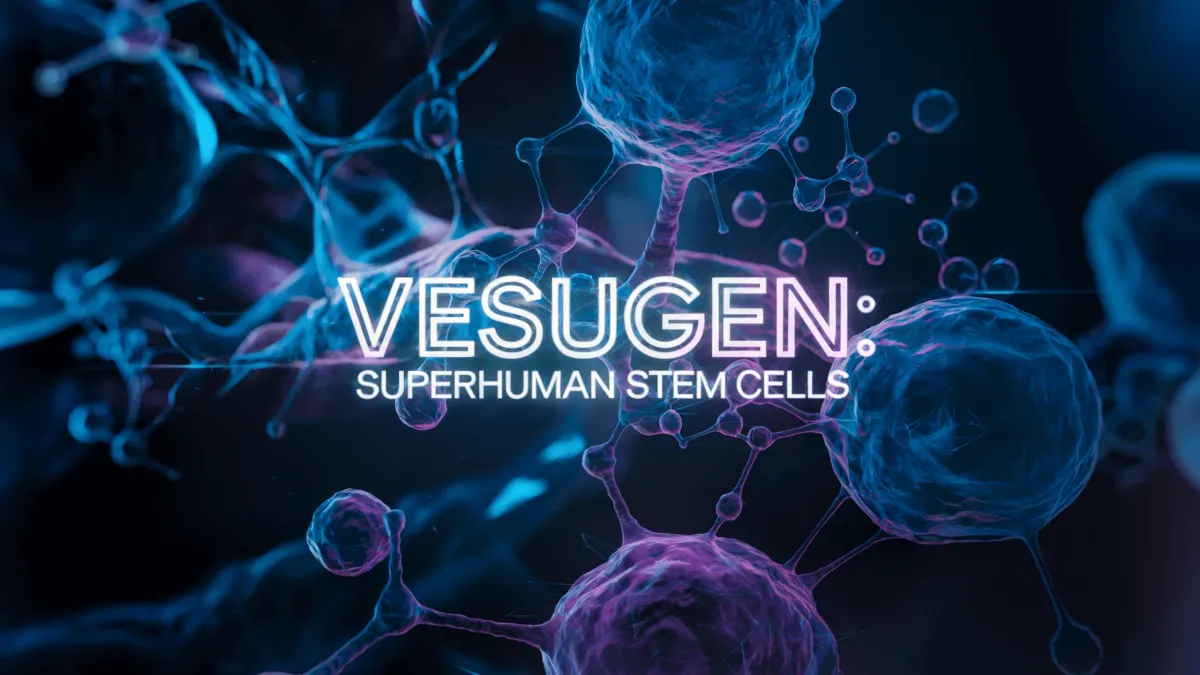
Imagine if your body had cells so powerful, they could regenerate and repair virtually any tissue or organ, including your brain and your heart. Whether you're facing the toll of aging, recovering from an injury, or battling disease, these cells could heal you from the inside out.
You do have these cells. They’re called mesenchymal stem cells The problem is that as we age, these stem cells
Don’t just decrease in number, but they lose their ability to function at their peak. This decline limits your body’s capacity to heal and regenerate.
In traditional Western medicine, the go-to solution for replenishing stem cells involves expensive stem cell clinics. These treatments can cost upwards of $20,000 for a single session.
But what if there was a way to activate your body’s own stem cells naturally, effectively, and at a fraction of the cost?
Vesugen is a peptide discovered by Professor Vladimir Khavinson with the sequencelys-glu-asp. It has been proven to activate our body's own stem cells, increasing the irreplicative division and delaying their senescence. Vesugen was discovered during Khavinsons analysis of Ventfort, a peptide extract derived from bovine vessels. While vesugen is naturally present in Ventfort, it exists in very low concentrations.
In this article, you’ll discover why Vesugen represents the future of human healing and how it could redefine what’s possible for human healing and longevity.
Vesugen is a Breakthrough in Stem Cell Science
The decline in MSC quantity and quality with age is a well-established contributor to impaired tissue repair and regeneration¹,² While many attempts to reverse this decline in vitro have failed¹, one which contained a retrovirus expressing telomerase reverse transcription showed some results³. However, despite the epitalon peptides ability to express telomerase directly in MSC’s, Vesugen significantly outperformed it in reducing the expression of senescence markers p16 and p21, achieving reductions of 1.82–3.23 times compared to Epitalon’s 1.56–2.44 times⁴.
• Vesugen, which has been shown to enhance the proliferation of MSC’s by 200% within five days compared to the control in 2 independent studies⁴,⁵.
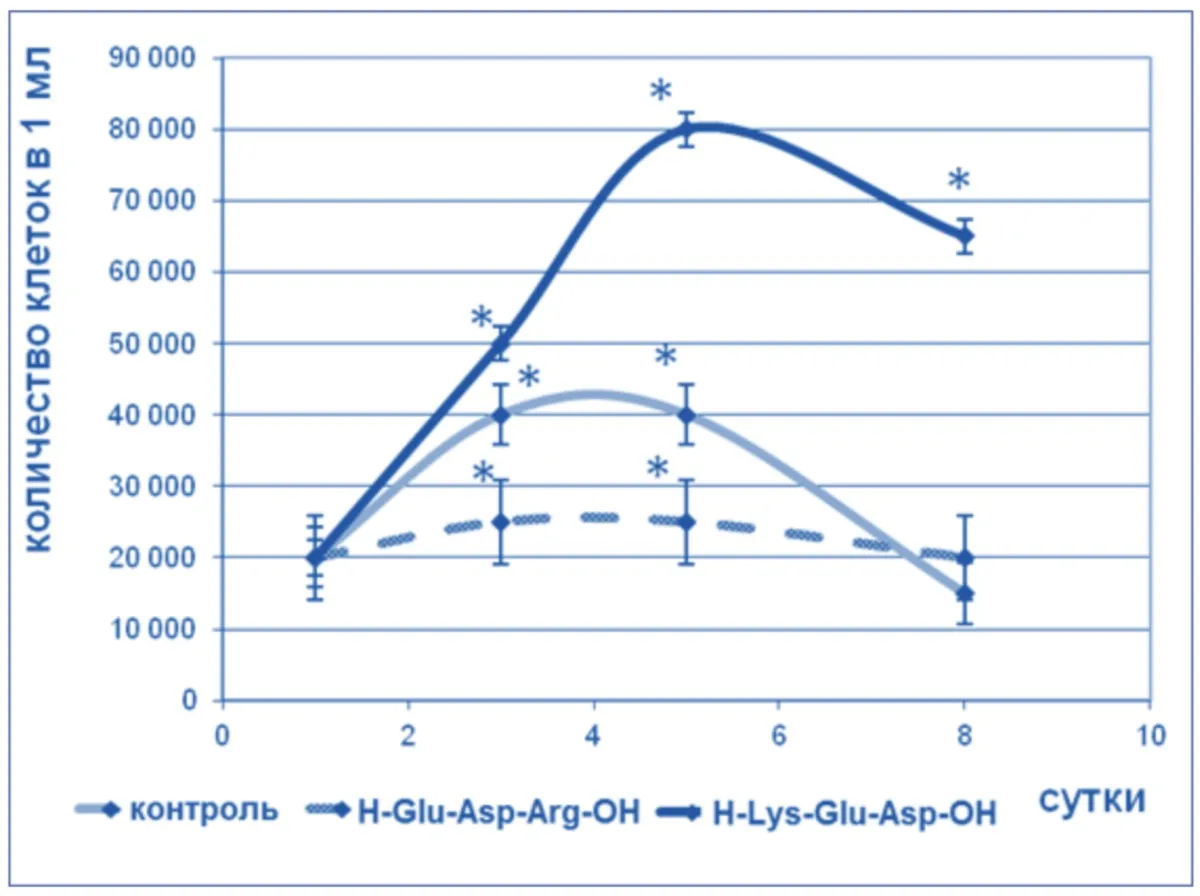

Vesugen was additionally shown to enhance cell differentiation in Osteogenic, neural, and immune cell linages⁸ and skin fibroblasts⁹.
• Unlike therapeutic agents that merely mobilize stem cells from the bone marrow without addressing senescence or functional decline⁸, Vesugen directly enhances MSC replication and function⁴,⁵.
Although the precise mechanism hasn't been conclusively proven, it has been shown that vesugen reduces TNKS2 by 4 times in MSC's in passage which helps to prevent telomere degradation and maintain cellular
processes⁹.
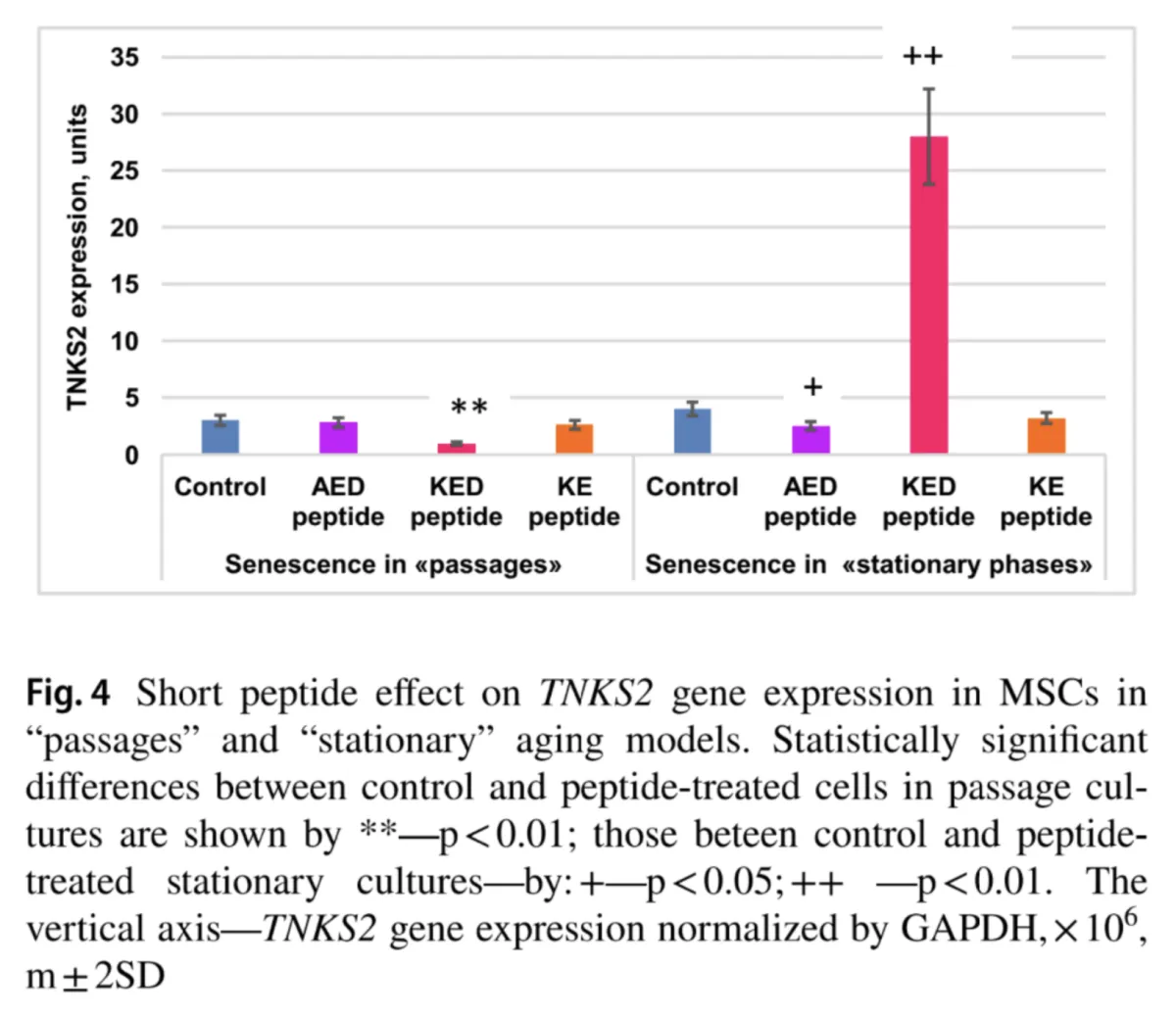
Vesugen reverses Senescence-Associated Secretory Phenotype (SASP) and Polyploidy: A Vicious Cycle of Aging
A harmful example of cellular signaling is the SASP. This occurs when senescent endothelial cells release pro-inflammatory cytokines (IL-1B, IL-6, and IL-8) and extracellular matrix-degrading enzymes (matrix metalloproteinases)¹⁰. These secretions promote chronic inflammation, leading to vascular damage, atherosclerosis, and cardiovascular disease¹⁰. To understand the significance of Vesugen in being able to combat this condition, we should understand more about what this condition is and how we are affected by it.
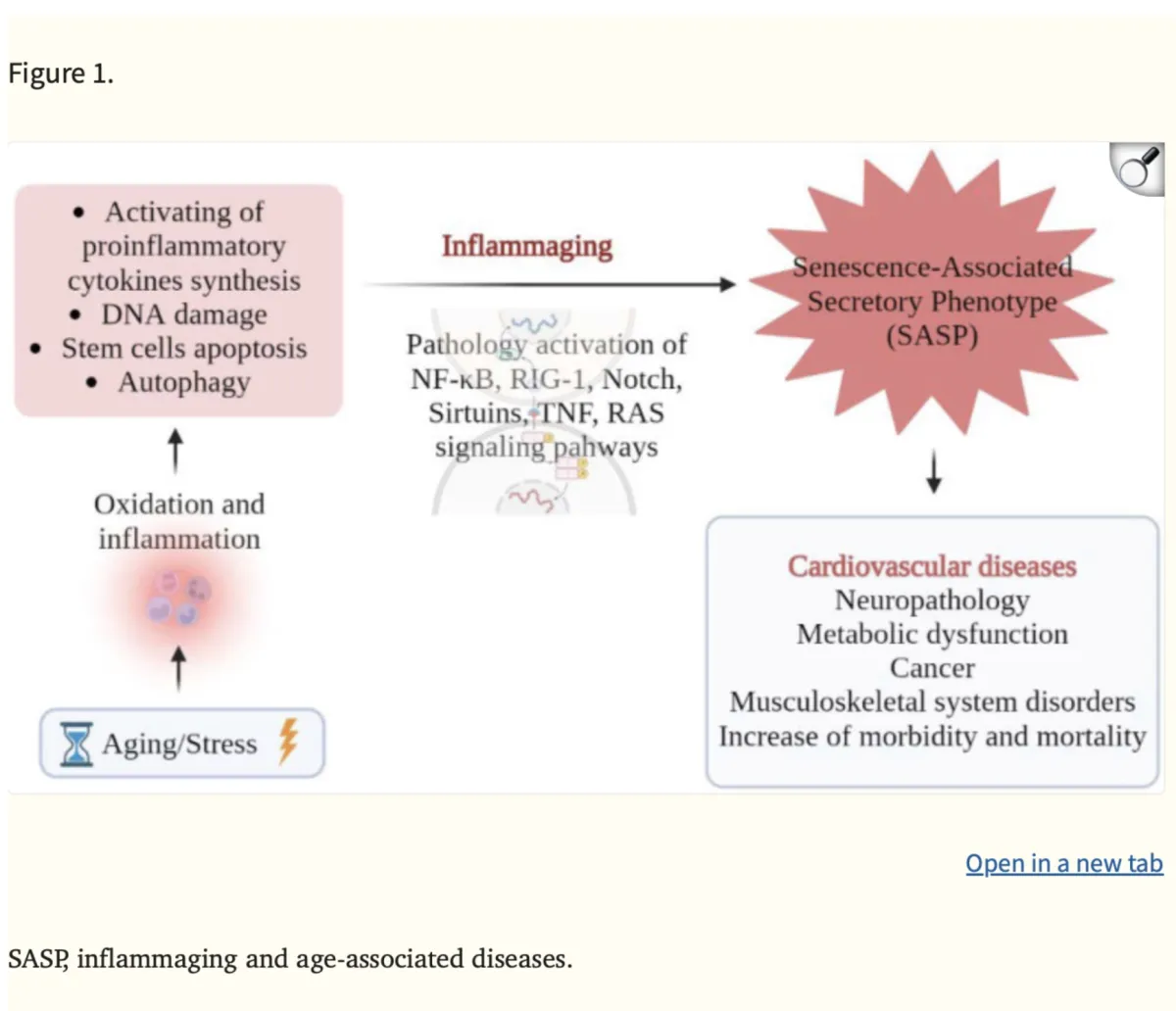
SASP is triggered by DNA damage, the buildup of reactive oxygen species, and telomere shortening. These factors cause oxidative stress and inflammation, leading to damage in blood vessels. Over time, this inflammation disrupts mitochondrial function and weakens the connections between endothelial cells and surrounding structures. The result is leaky, fragile blood vessels that impair circulation and increase pressure in the surrounding tissues¹².
Cytotoxic stress activates the NLRP3 inflammasome, intensifying inflammation and creating a tumor-promoting environment. While SASP initially halts proliferation and recruits immune cells for damage clearance, it paradoxically fosters tumor progression by driving chronic inflammation, vascular instability, and immune evasion.
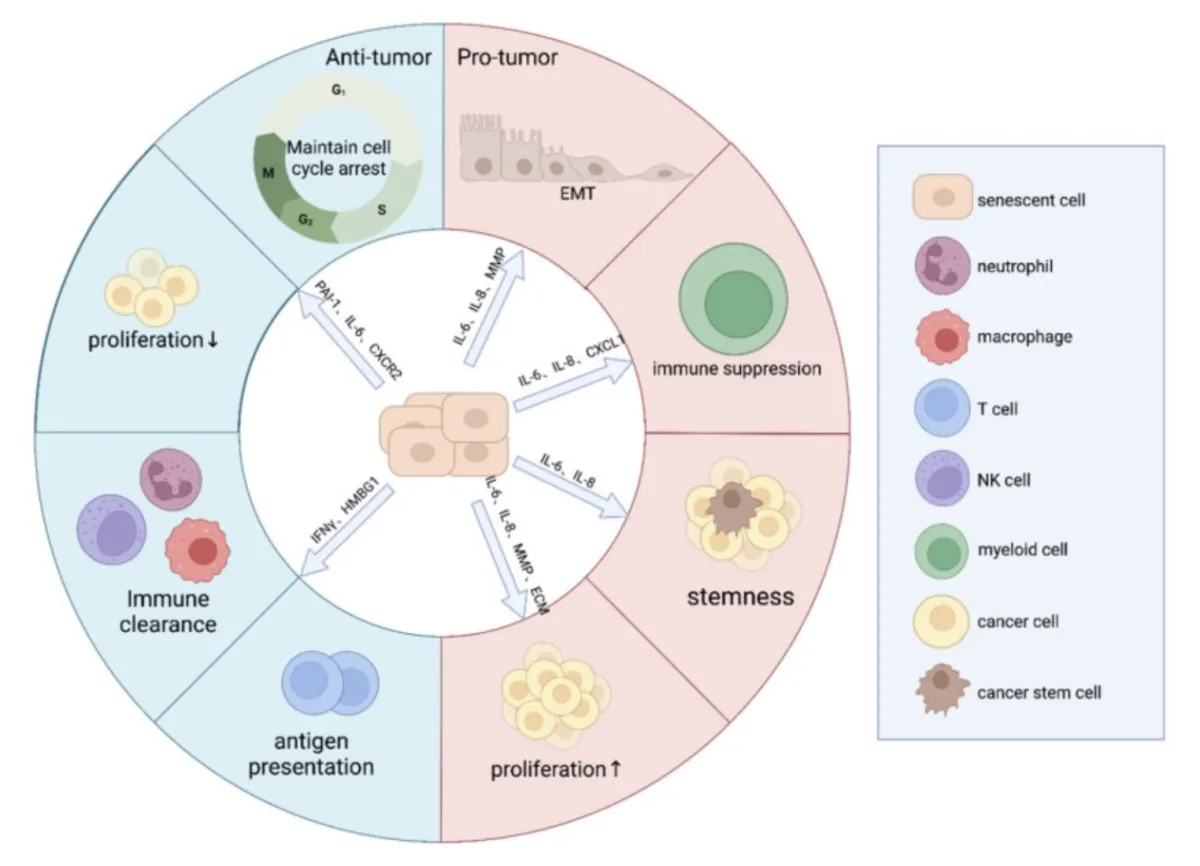
Avoiding SASP is vital because it leads to the accumulation of polyploid endothelial cells (cells with extra chromosomes). By the age of 35–40, approximately 30% of endothelial cells in the human aorta are polyploid¹³. Under high glucose conditions, these cells can further multiply their chromosomes, becoming tetraploid. This state worsens their dysfunction, amplifying the damaging effects of SASP¹⁴.
However, Vesugen has been proven to reverse the pathogenesis of SASP¹⁰.
It has been proven to:
• Halt inflammatory cytokines by reducing senescence markers (p16, p21)¹⁰.Promote vasodilation by decreasing endothelin-1 and connexin-37, while boosting SIRT1 activity¹⁵.
• Activate SIRT1¹⁵, which enhances mitochondrial function¹⁷, improves insulin sensitivity¹⁶, and promotes NAD+ production through PGC1a¹⁸, reducing the occurrence of polyploidy¹⁹.
• Reduce the synthesis of E-selectin, an adhesion molecule involved in the formation of atherosclerotic plaques²⁰.
• Stimulate proliferation by Increasing ki67²¹ by activating mki67 gene expression²².
• Enhance red blood cell stability, improving osmotic hemolysis in culture and reducing lipoprotein oxidation²³.
These cellular level changes translate directly into clinical benefits, as demonstrated in human trials where it:
• Improves Senile purpura In patients aged 70-82, Vesugen improved skin and vascular wall durability as evidenced by the hess test, which showed reduced symptoms of spontaneous hemorrhages on the face, neck, forearms, and hands, even after other treatments failed²⁴.
• Reduces likelihood of forming dangerous blood clots via reduced fibrinogen in both controls and healthy people while still improving clot efficiency via improved recalcification time²⁴.
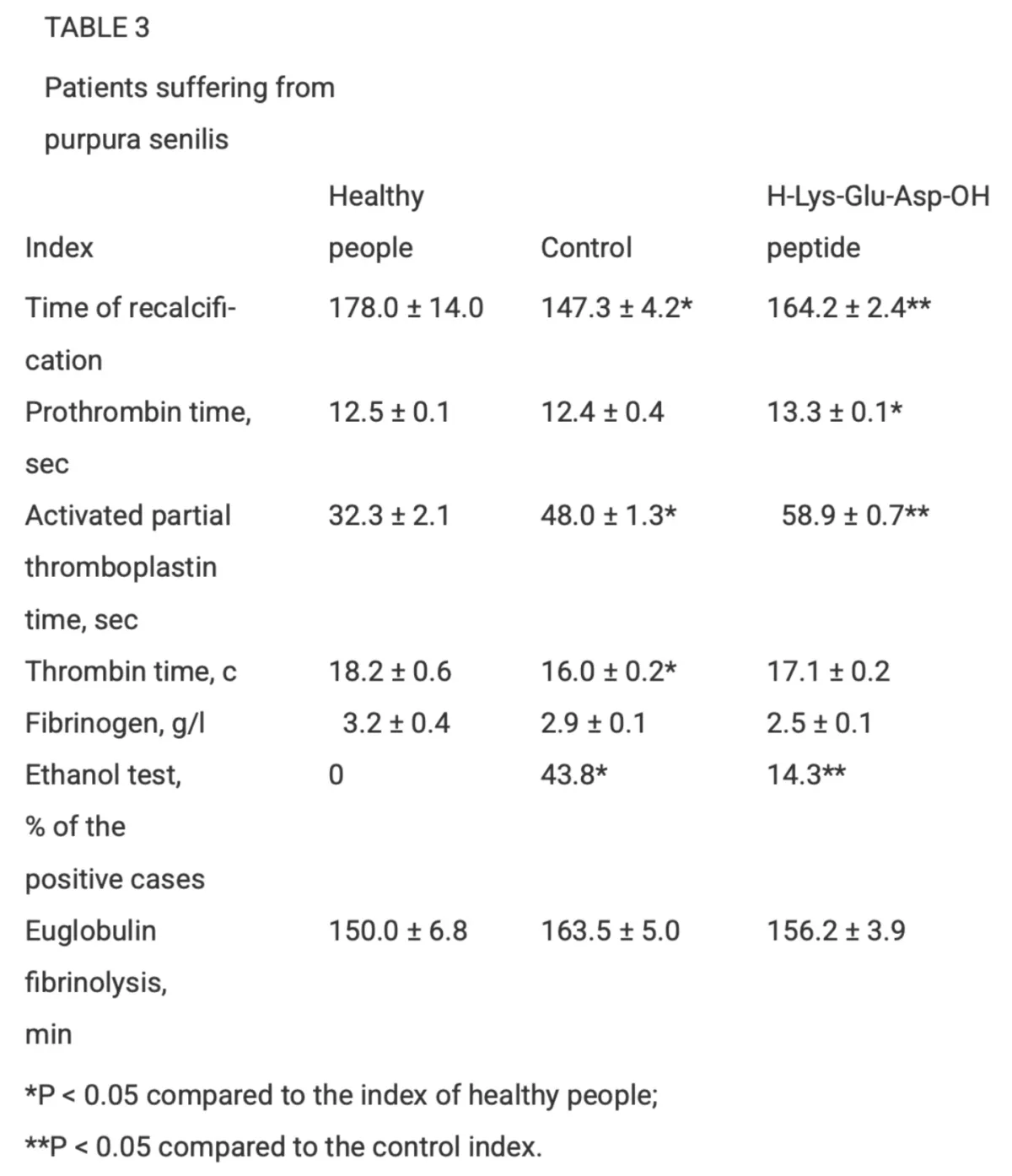
Vesugen and Brain Health
Vesugen’s multifaceted benefits extend to neurological advantages, including the prevention of neuronal death in culture²³ and superior stimulation of stem cell differentiation into neurons compared to Epitalon, Vilon, and Cartalax. This effect is demonstrated through significantly higher levels of GAP43 and Nestin expression²⁷.
These properties suggest Vesugen could theoretically support various neurodegenerative conditions, such as addiction Models as Bone marrow-derived MSCs have been shown to restore hippocampal activity, enhance levels of BDNF, GNDF, and bFGF, improve cognition and prevent in addiction scenarios, including alcohol and opioid dependency²⁸.
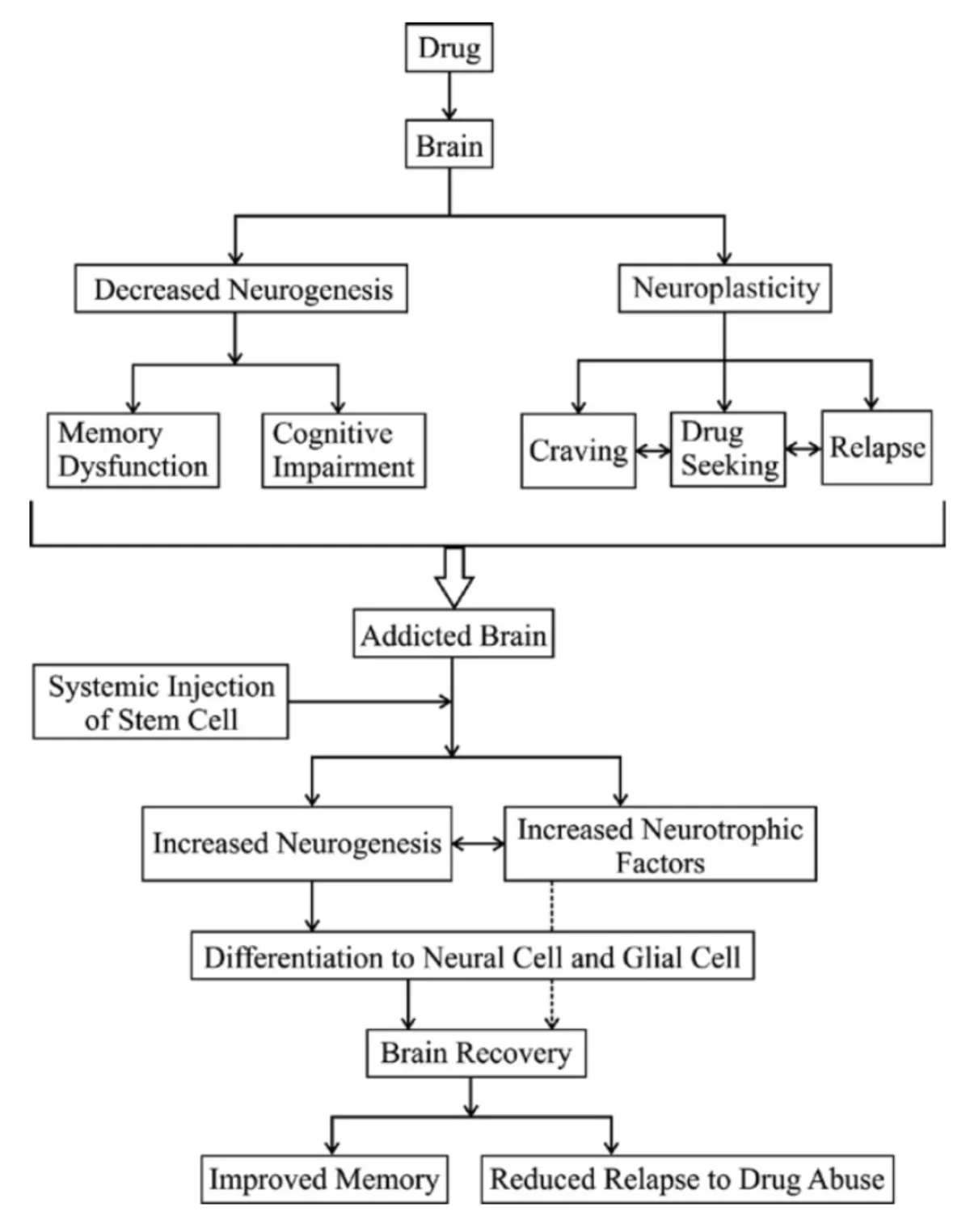
Chronic Traumatic Encephalopathy in which stem cells support neural survival and recovery and protect the BBB from oxidative stress²⁹. Indeed, Vesugen has demonstrated remarkable potential in addressing neurodegenerative conditions. In an amyloid synaptotoxicity Alzheimer’s disease model, Vesugen partially reversed damage to mushroom spines in hippocampal cultures treated with AB42³⁰. However it did not do so as well as Pinealon.
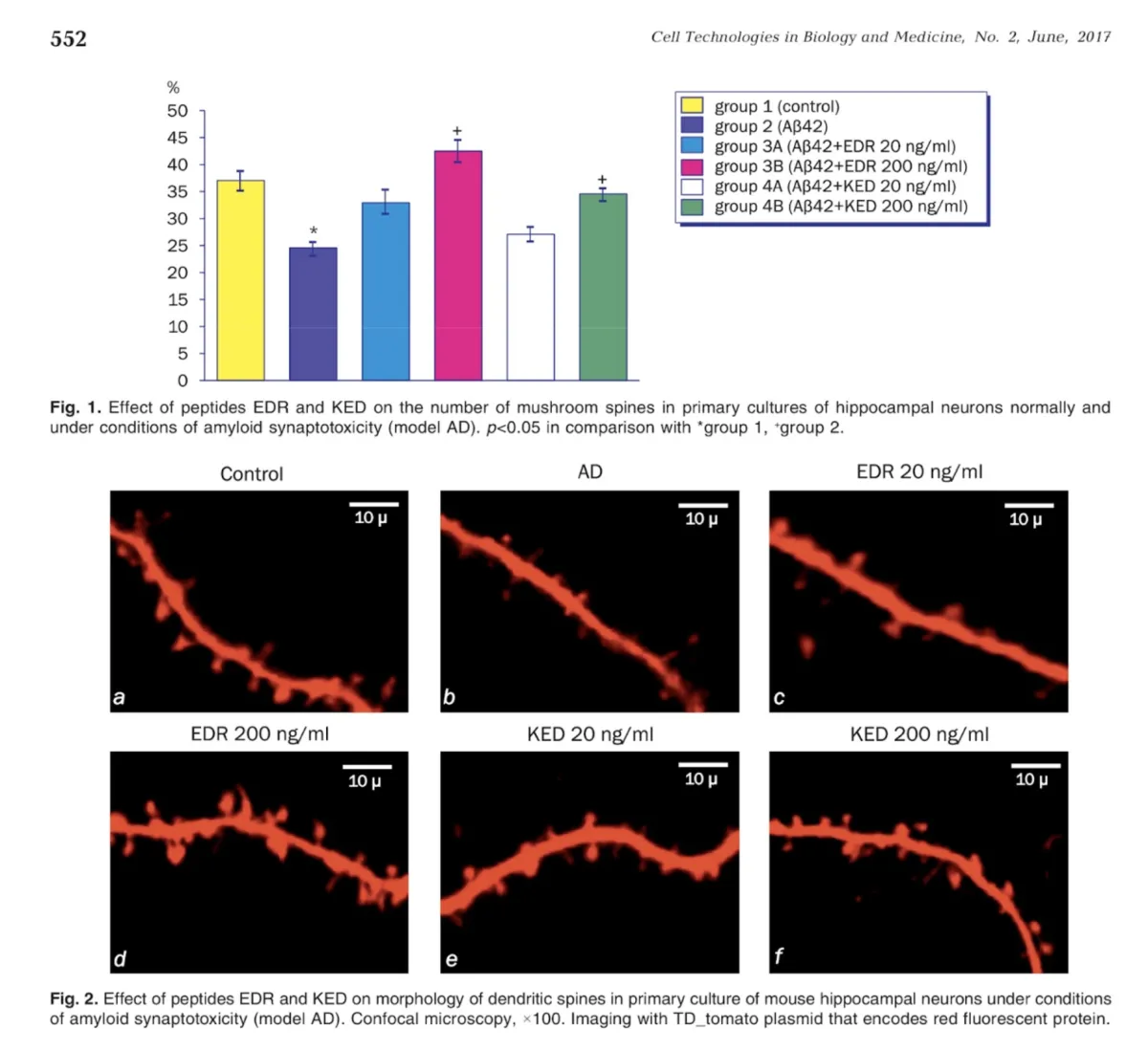
These benefits extend to in vivo models, as demonstrated in 5xFAD mice, which exhibit impaired LTP starting at 4 months of age. A one-month treatment with Vesugen partially restored LTP, suggesting its potential to enhance synaptic plasticity³¹. Vesugen increased dendritic spine density in the CA1 region of the hippocampus by 22% and mushroom spine density by 27%, surpassing Pinealon, which restored dendritic spine density by 13% but showed a more limited effect on mushroom spines. The restoration of mushroom spines by Vesugen is particularly significant, as these spines are critical for maintaining functional synaptic connections and memory storage. Interestingly, while Pinealon demonstrated greater benefits in vitro³², Vesugen's superior performance in vivo underscores the critical importance of in vivo studies for understanding therapeutic potential.
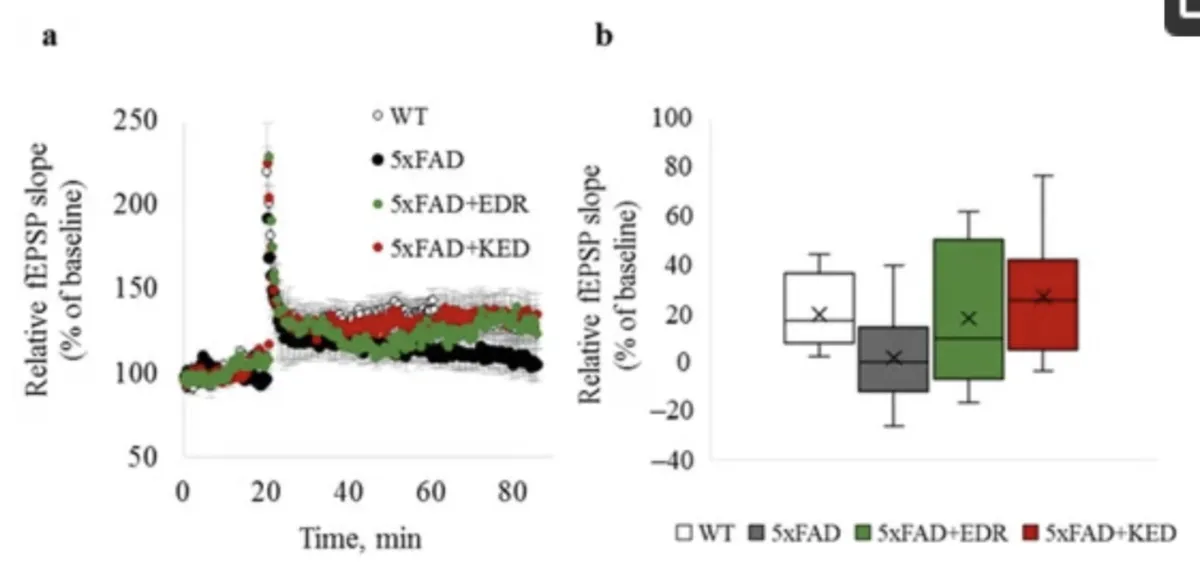
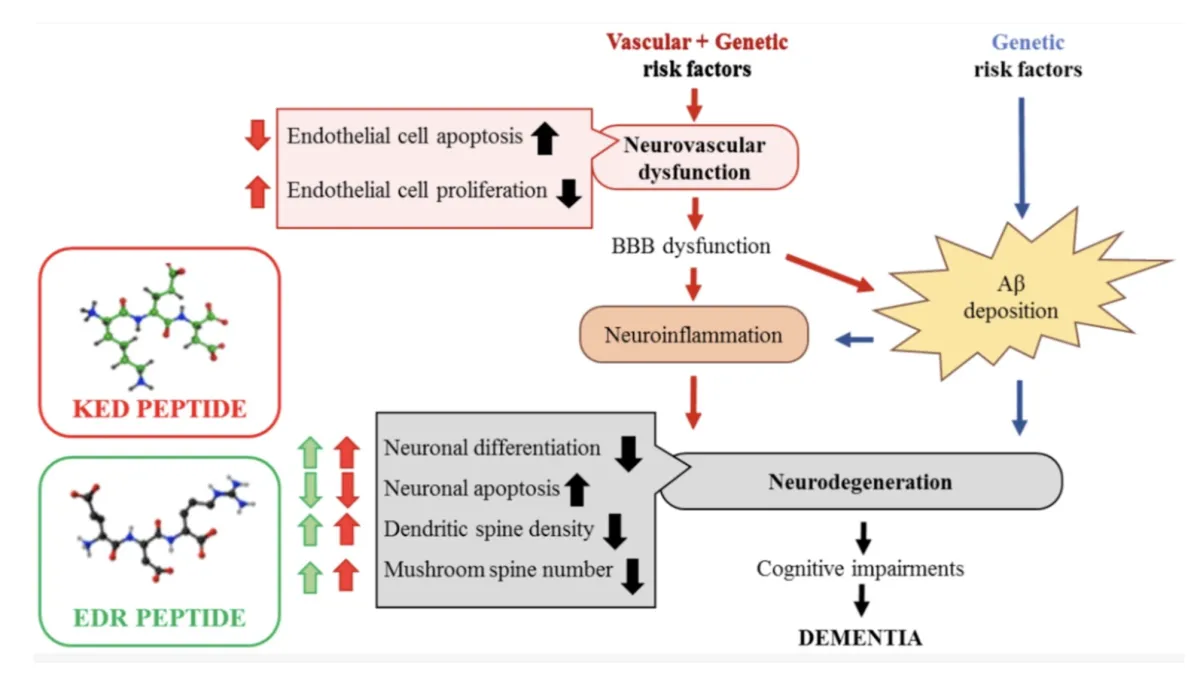
Vesugen also:
Improved psycho-emotional stress and sleep quality, as observed in workers such as lorry drivers³³.
Alleviated symptoms of organic brain syndrome³⁴, a condition characterized by memory loss, confusion, impaired thinking, emotional disturbances, and personality changes, often arising from trauma, infection, disease, or degenerative conditions.
Vesugen's Assistance to the Athlete
Vesugen’s benefits in recovery and brain health may have significant carryover to sports and activities requiring quick recovery, rapid decision-making, and reaction speed. Vesugen has been shown to enhance reaction time and overall sports performance when combined with Pinealon³⁵. This research was conducted by an author who holds a Guinness World Record in high-altitude river rafting³⁶.
Vesugen as a Geroprotector
Vesugen exhibits significant geroprotective properties, as shown by its ability to reduce biological age in healthy middle-aged and elderly individuals. In just a short 20-day course of two capsules per day, participants experienced an average biological age reversal of 7 years, but with a greater effect when combined with pinealon³⁷. However, the specific methodology for determining this reduction was not specified. Additionally, Vesugen’s capacity to improve SIRT1-PGC1a activity, enhance blood vessel health, and combat neurological diseases may support its potential lifespan extension.
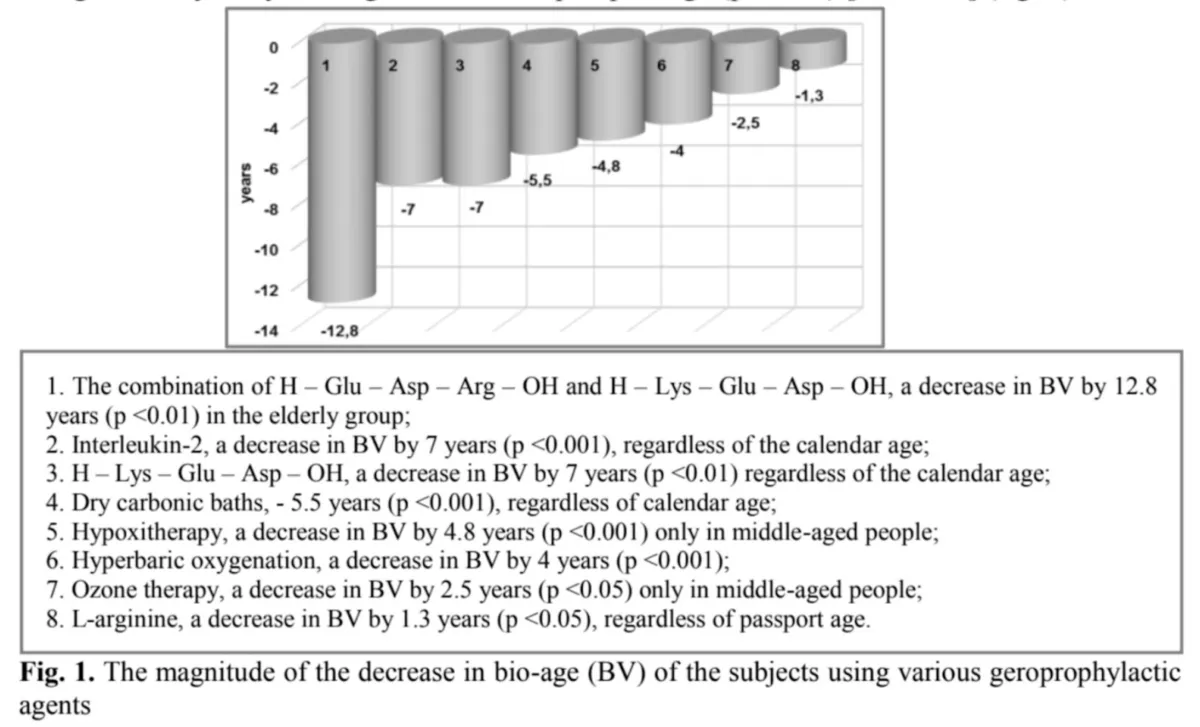
Video transcript of Professor Vladamir Khavinson Discussing Vesugens role in stem cells:
This is a peptide called Vesugen.
This is a patent on Vesugen.
But for what?
For the stimulation of stem cells.
Vesugen has been the most powerful, I'll say, the most powerful stimulator of stem cells. Vesugen is not just about vessels; it's a super drug.
Why is it so important?
We have about 30% stem cells in all of our organs and tissues.
That’s why some people have lived for 100 years.
These individuals are utilizing all the resources that have been built up over time.
In every organ, the brain, the liver, there are pluripotent stem cells everywhere.
They are kind of "frozen," and for some reason, they regenerate. But from where?
These are the reserve cells.
The question is: where do they regenerate from, and how do we activate these reserve stem cells that we all have?
Vesugen, it turns out, is the latest discovery.
It stimulates not only vascular cells but also stem cells throughout the body.
The value of Vesugen exceeds anything available right now.
In fact, we are even considering using it as a drug specifically as a stem cell stimulant. Understandable, right?
Clearly, 100 mcg is not enough. Yes, a drug with a concentration of 500 mcg, injectable and directly into the bloodstream, is much more effective.
Vesugen is a highly valuable drug for activating stem cells in humans, not a transplant like the various questionable clinics out there claim to offer.
You know, the "stem cell" ones or those doing other shady practices.
The point is this: activating your own stem cells is the right way forward.
Dosing
Vesugen is commonly dosed at 2–4 capsules per day when used clinically, often divided into 2 separate doses (200 mcg–400 mcg). However, the official patent recommends a higher range of 0.01 mg/kg–0.1 mg/kg²⁴. Based on dose conversions from Alzheimer’s studies in mice to human equivalents, the suggested dose would be approximately 2 mg for a 70 kg individual. Professor Khavinson further proposed a 500 mcg injection as the optimal dosage to unlock Vesugen’s stem cell benefits.
Conclusion
Vesugen is a powerful peptide that stimulates the differentiation of various lineages of multipotent stem cells, such as ligament and mesenchymal types, but not hematopoietic stem cells. It represents a groundbreaking advancement in regenerative medicine. Its unique ability to address stem cell senescence, vascular aging, and immune function, as well as its capacity to improve the psycho emotional state in workers and support neurodegenerative conditions like Alzheimer’s disease, highlights its therapeutic potential and the need for further human trials.
By Brenden Henry
February 25th, 2025
About The Author:
Do you know the truth about peptides? We believe human beings deserve to live happy, healthy and pain-free. To help you do that, we turned our $997 peptide mastercourse into the biggest, most comprehensive and most important book on peptides ever written. And we’re giving it away FREE HERE:
This is our gift to you. We want to help you live a BETTER, HEALTHIER and HAPPIER life! This book will help you cut through the noise, get answers to your questions and teach you more about peptides than you’d learn in a $52,000 biology degree. It’s written by Brenden Henry, the world’s number one authority on peptide science, Dr. Ali Mazloum and Dan Fox. You can get your free physical copy right now from the link above!
Do you have health issues you haven’t managed to solve, concerns about your body declining or a desire to experience the highest levels of biological optimization? You should know about the life-changing results we create with our peptide transformation programs. Brenden Henry, Dr. Ali, and our team of specialists are some of the most advanced biohackers on Planet Earth. We can help you achieve almost ANYTHING you want when it comes to your brain and body. Take the next step here:
https://peptides.link/transformation
Want our most trusted & recommended peptide store? Go here:
https://peptides.link/vitastream
(use code CHANGEAGE10 for 10% off. They’re great quality, they have great service, they’re great people and they sell peptides made in the USA with 50% more ingredients than others!)
Do you want the FULL step-by-step roadmap to heal, enhance and transform your biology with peptides? This is the most comprehensive, complete, advanced, valuable and useful peptide class on Planet Earth (absolutely nothing else comes close). If you’d like to check this out, go here:
Want to discover exactly what peptides are capable of and how they’re so life-changing yet so unknown? Get your free resource kit, The Life-Changing Magic of Peptides: How the Most Important Discovery In Modern Medicine Was Hidden From the World by clicking here:
